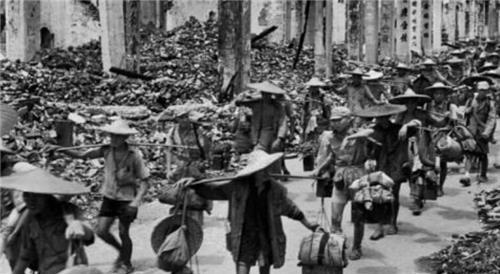Whether it is victory or defeat, the people are displaced and fleeing everywhere, in ancient times, in order to build their prestige, generals often choose to slaughter a city to establish their prestige, innocent people, they were implicated.

In modern warfare, the situation is the same, in 1944, the Japanese army launched the Battle of Yuxianggui, Japan was in the Pacific War after the defeat, the sea traffic was cut off, the Japanese rout, but also let the crazy Japanese army, take a fancy to China's geographical location.
In the Battle of Henan, Japan gathered 150,000 troops, and at the beginning of the battle, Okamura Ningji commanded a total of 5 divisions and 3 brigades of the 12th Group Army and a flying regiment of 168 aircraft.
Gangcun Ningci carried out the first round of bombing, Henan was deeply involved in the war, Henan people were forced to leave their hometowns and go all the way to the west, which was the famous "great escape" in the War of Resistance, whenever the Japanese army approached, a large number of refugees joined the fleeing team, along the way due to the escape.
Food is also a big problem, they do not have enough to eat, not warm clothing, some seriously ill family members can not be cured, can only choose to abandon on the side of the road, plus the Japanese attack, fleeing became more difficult, at that time as long as they heard that there were trains heading west, whether buses or trucks, thousands of people flocked to the city.
Where there are gaps in the train, basically crowded with people, luggage racks, gaps between trains, train roofs, a train looks like it is full of people, on the way, people fall down, it is not a new thing, as long as you can survive, it is really lucky.
Those who did not get on the train, can only walk step by step, on the highway of Guizhou, people crowded, people next to people, the flow of people can not see the end, no one knows whether the road ahead is safe, only know that it is absolutely unsafe to stop, they have seen the atrocities of Japan, only to go to Guizhou there is a possibility of survival.
From mid-April to December 1944, during the Battle of Yuxianggui, 146 cities, 7 air bases, 36 airfields were destroyed, and about 60 million civilians were involved in the war, of which 19,000 were killed by the Japanese army, and Yuxianggui and other places were important agricultural places.
Some materials have also been robbed, rough calculations are 50,000 quintals of rice valley 9500 quintals of rice flowers, destroyed agricultural tools worth 47 million yuan, and in the process of fleeing people died, even more countless, the war sometimes has to be forced, but if you do not fight, the country will be destroyed.
At that time, there were many refugees who embraced the nobility, and the streets of Guizhou were very crowded, they squatted in the corners, and occasionally someone would give alms, but most of the refugees did not make it to Guizhou. After the end of the war, the Japanese surrendered for hundreds of years, but did not make any formal apologies for their aggression.